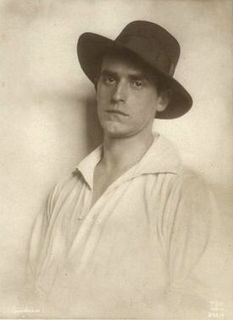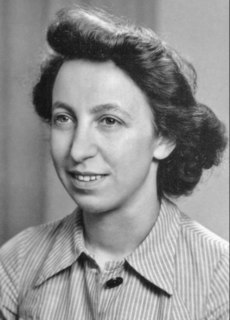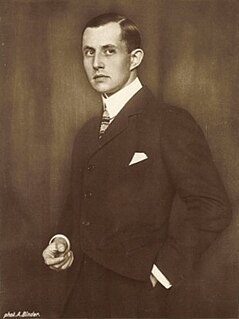
Thea Gabriele von Harbou was a German screenwriter, novelist, film director, and actress. She is remembered as the screenwriter of the science fiction film classic Metropolis (1927) and for the 1925 novel on which it was based. Harbou collaborated as a screenwriter with film director Fritz Lang, her husband, during the period of transition from silent to sound films.

Egon Friedell was a prominent Austrian cultural historian, playwright, actor and Kabarett performer, journalist and theatre critic. Friedell has been described as a polymath. Before 1916, he was also known by his pen name Egon Friedländer.

Götz George was a German actor, the son of actor couple Berta Drews and Heinrich George. His arguably best-known role is that of Duisburg detective Horst Schimanski in the TV crime series Tatort.

Heinrich Wilhelm "Heinz" Rühmann was a German film actor who appeared in over 100 films between 1926 and 1993. He is one of the most famous and popular German actors of the 20th century, and is considered a German film legend. Rühmann is best known for playing the part of a comic ordinary citizen in film comedies such as Three from the Filling Station and The Punch Bowl. During his later years, he was also a respected character actor in films such as The Captain from Köpenick and It Happened in Broad Daylight. His only English-speaking movie was Ship of Fools in 1964.

Hannelore Elsner was a German actress with a long career in television and film. She first performed on stage in Munich, and later starred in popular films and television series such as Die Schwarzwaldklinik, and as the lead character, Inspector Lea Sommer, in the series Die Kommissarin. She was recognized internationally for her lead role in the 2000 film Die Unberührbare, shown at the Cannes Film Festival.

Destiny is a 1921 silent German Expressionist fantasy romance film directed by Fritz Lang and inspired by the Indian folktale of Savitri. The film follows a woman desperate to reunite with her dead lover. It also follows three other tragic romances, set in a Middle Eastern city; in Venice, Italy; and in the Chinese Empire.
Carl Wilhelm, was a prolific German film director, film producer and screenwriter of the silent film era, at the end of which his career apparently entirely faded away and he vanished into obscurity.

Joe May was an Austrian film director and film producer and one of the pioneers of German cinema.

Carl de Vogt was a German film actor who starred in four of Fritz Lang's early films. He attended the acting school in Cologne, Germany. Together with acting he was also active as a singer and recorded several discs. His greatest hit was "Der Fremdenlegionär". An extremely successful actor in his early career, he died in relative obscurity in 1970.

Georg John was a German stage and film actor.

Gertrude Welcker was a German stage and silent film actress. She appeared in 64 films between 1917 and 1925.

Hilde Meisel was a Jewish German socialist and journalist who published articles against the Nazi regime in Germany. While in exile in England, she wrote under the pseudonym Hilda Monte, calling for German resistance to Nazism in magazines, books and in radio broadcasts. She acted as a courier and repeatedly undertook secret operations in Germany, Austria, France and Portugal, although as a social democrat and Jew, it was extremely dangerous for her to do so. Other code names she used in exile were Hilde Olday, Selma Trier, Helen Harriman, Eva Schneider, H. Monte, Hilda Monte and Hilde Monte.

Richard Otto Bruno Kastner was a German stage and film actor, screenwriter, and film producer whose career was most prominent in the 1910s and 1920s during the silent film era. Kastner was one of the most popular leading men in German films during his career's peak in the 1920s.

Die Nibelungen is a 1966/1967 West German fantasy film released in two parts, Siegfried von Xanten and Kriemhilds Rache. It was directed by Harald Reinl and produced by Artur Brauner. Die Nibelungen starred Uwe Beyer, Karin Dor and Herbert Lom. The two films were a remake of Fritz Lang's 1924 silent classic Die Nibelungen, which was in turn based on the epic poem the Nibelungenlied.

Georg Wrba was a German sculptor and graphic artist. He created some 3,000–4,000 works, including as a collaborator of the Zwinger workshop.
Hermann Picha was a German stage and film actor. Picha was extremely prolific, appearing in over 300 short and feature films during the silent and early sound eras. Picha played a mixture of lead and supporting roles during his career. He played the title role in the 1920 film Wibbel the Tailor, directed by Manfred Noa. He appeared in Fritz Lang's Destiny.

Mia May was an Austrian actress. She was married to the Austrian film producer and director Joe May and appeared in 44 films between 1912 and 1924. Her daughter was the actress Eva May.

Decoy is a 1934 German adventure film directed by Hans Steinhoff and starring Jakob Tiedtke, Viktor de Kowa, and Jessie Vihrog. A separate French-language version, The Decoy, was released the following year with a largely different cast.
Shame on You, Brigitte! is a 1952 Austrian comedy film directed by E.W. Emo and starring Heinz Rühmann, Hans Moser and Theo Lingen. It was later released in West Germany under the alternative title Wir werden das Kind schon schaukeln. It is based on the play Bubusch, a German-language version of a work by Hungarian writer Gábor Vaszary, which had previously been adapted into the 1943 German film Geliebter Schatz.
Clara Hepner also known by the pseudonym Klara Hepner, or Clara Muschner, Klara Muschner, sometimes Clara Hepner-Muschner, born Clara Freund in Görlitz, in Lower Silesia, Germany. She is best known as a poet and author of children's stories.
















